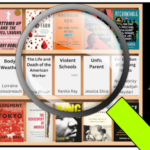
Presenting the nominees for worst decision, worst coverage, worst story, and worst journalist.
By Alexander Russo
For many educators and students, it’s fast approaching time to go back to school. (Parents, hold on, you can make it!)
That also means education writers are hard at work producing back-to-school stories.
Over all, the approaching 2017-2018 school year should make everyone feel excited and optimistic. There’s a lot of good education journalism being produced right now. The Grade celebrated the best coverage of 2016 a few months ago and highlights strong pieces in each week’s newsletter. Seriously. There are so many smart, hard-working, creative people on the beat.
However, a stubborn sliver of the past year’s education journalism was inaccurate, ill-considered, or misleading.
Some of the thematic problems include failing to provide readers with a broader context, superficial coverage that doesn’t take readers below the surface of events, and racial or cultural blindness that leaves out diverse voices and perspectives. And some of the biggest, best-resourced outlets – the New York Times, Washington Post, etc. – are contributing to the problem.
There’s precious little time for education journalists to reflect on the work that they and their colleagues are doing, and not all that much public accountability. And so now is a good time to look back at some of the biggest mistakes and most vexing problems that have plagued education journalism in the past year – in hopes of encouraging everyone to try fresh approaches, dig deeper, and make their coverage smarter and more compelling in 2017-2018.
Three to five nominees are listed for each category (Worst Decision, Worst Story, Worst Coverage, & Worst Journalist). A reader’s choice option is available, just in case. The winners will be announced next month.

Worst Decision
Baltimore Sun: For letting star reporter Erica Green go to the New York Times just as she’s been doing such amazing work (on segregation and juvenile justice, among other things). Perhaps there was no stopping the Times, but I don’t know if the Sun tried as hard as it could have. Did they promise her the moon and the stars? They should have. And the Times had better be treating Green right.
Vox: For taking Libby Nelson off the education beat just when we needed her most. (Well, maybe not during the campaign but since then for sure.) Compelling explainers, historical context, and steady fact-checking have been in short supply since her departure. It’s great having Barnum around (now at Chalkbeat) doing some of the same kinds of work, but he’s no Nelson (yet).
USA Today: For taking veteran education reporter Greg Toppo off education even part of the week and making him cover demographics and even breaking news. He makes it look easy and still produces a bunch of stories I want to read, but I’m greedy. He’s one of the longest-serving national education reporters out there. He knows where all the bodies are buried. I want all his time on education, not some of it.
The NYT: For announcing a bold new vision for education coverage last August, then failing to fill the lead position for so long. It’s coming on a year now, and the lack of direction and clarity shows – especially when it comes to what gets covered (and what doesn’t). This is an unfortunate period for the Times education coverage to be fishtailing all over the road.
The LA Times: For taking outside money from education-focused foundations including Broad (a funder of The Grade) to pay for part of its education news operation over the past two years. There are lots of other outlets taking outside funding to cover education, but the expanded reach afforded by the outside money hasn’t seemed worth the near-constant questioning of the LAT’s credibility. Plus, the setup doesn’t seem to have allowed the excellent Joy Resmovits to do the state- and national-level reporting we remember from the Huffington Post.
The Education Writers Association: For holding an annual education journalism competition that doesn’t attract or recognize all of the best writing of the year — work from Reuters, the Boston Globe, Salt Lake Tribune, & the NYT — that’s being praised in other places like the Pulitzer Prize committee. And also for moving slowly and secretively on something as urgent as the need for increased diversity at education outlets and on education teams. We need a revamped setup for the 2017 awards process, plus regular updates on the diversity task force and more training and support for editors and reporters working with and covering diverse communities – stat!
Readers’ choice: _______________________________

Worst Story
NYT: Its interactive data story published by The Upshot used unnecessarily simplistic school quality measures, misleading commute times, and confusing graphics to compare school quality in suburbs where people might want to consider moving. As if that wasn’t bad enough, the paper refused to correct or clarify the story even when Stanford researcher Sean Reardon (whose work the piece was based on) objected. So much for reader trust and journalistic accountability.
Philadelphia Inquirer: Its “feel-good” story about a white family’s decision to choose a local elementary school over a higher-performing alternative gave little voice to the community parents and educators at the neighborhood school. Initially flagged by Nikole Hannah-Jones, this piece remains one of the most vivid examples of the many challenges facing white reporters – even veteran Pulitzer Prize-winning reporters – who cover black and brown communities.
ProPublica: In an otherwise powerful series on alternative schools, the nonprofit investigative outlet got off to a very rocky start by focusing on an outlier example (a charter school network in Orlando) rather than district-run alternative school programs that are much more common. Charter and for-profit alternatives may be on the rise, but the vast majority of alternative schools are district-administered programs, and have been around much longer. Readers of the kickoff story had little chance of understanding this.
Readers’ choice: _______________________________

Worst Coverage
NYT National Desk: For inaccurate and superficial coverage of the DeVos nomination and confirmation processes. (No, DeVos can’t reasonably be held responsible for all or even most the many struggles of the Detroit public schools. No, she wasn’t in any real last-minute danger of losing her Senate confirmation vote.) Also for under-covering state and local education politics stories with obvious national appeal (MA Question 2 and LA school board election among them) and all but ignoring ESSA implementation until quite recently.
Boston Globe: For wall-to-wall coverage of last fall’s Ballot Question 2 on charter schools that somehow never really answered the central question of whether additional charter schools really drain funding from traditional schools. There’s only so much “he said, she said” that readers should have to put up with, and there’s so much outside expertise that could have been brought to bear on the question.
LA Times: For coverage of the LA School board race that focused too much on the outside funding and its sources and failed to report on school-level controversies and campaign dynamics that mattered to parents and probably determined the surprise outcome of the race. According to ousted board member Steve Zimmer and others, the race was won and lost in three communities where parents were upset with his decisions. Read all about it in the recent column co-published with the Columbia Journalism Review.
PBS: For a NewsHour story profiling a for-profit teacher preparation program called Teach Now never asked the obvious and necessary questions about quality and effectiveness rates. And, even more problematic, for a three-part series called School, Inc. touted the school choice view of the world without much of any intellectual rigor one might expect from a network that produces Frontline. That’s no way to try and be balanced, folks.
Readers’ choice: _______________________________

Worst Journalist
Valerie Strauss (Washington Post): For running other peoples’ work so often on her page rather than doing her own writing. For taking byline credits that should rightly go to the authors whose work she republishes. For publishing such a repetitive, homogeneous set of views (most of them penned by white and college-educated authors who can afford to write without pay). For thinking she can play the roles of columnist, op-ed editor, and fill-in news reporter without damaging her reputation and the paper’s. It’s nothing new – I wrote about it back in 2015. The Post recently added an “analysis” tag so that readers might figure out they’re not reading the news section of the paper. Post editor Marty Baron defended Strauss’s work at EWA17.
Kate Zernike (New York Times): Whether it was coverage of the SAT and ACT, Common Core testing, or Detroit schools, Zernike’s short-lived return to national education news was checkered with problematic journalism. Her 2015 story about the re-labeling of the Massachusetts state tests was contradicted by sources and the Boston Globe coverage. Her 2016 Detroit charter schools story misled readers about the research on charter school outcomes. Her problematic recommendation of Common Ground — a 1980s-era book about busing in Boston that downplayed black leaders’ voices – was a vivid illustration of someone who was phoning it in (and would soon leave the beat).
Alexander Russo (The Grade): What a jerk. He’s never worked in a traditional newsroom. He takes funding from pretty much anyone who will give it to him, including teachers unions, publishing companies, and pro-charter foundations. He treats journalists like journalists treat their sources. He takes swipes at everyone, even his friends. He tries to push newsroom diversity.
Campbell Brown (The 74): First she named the education news site she co-founded after a number nobody uses. Then she insisted on publishing a column in favor of Betsy DeVos – a funder – this past winter, at the expense of her outlet’s budding credibility. Last but not least, she ran off to Facebook, creating long-term problems for the outlet, which lost Matt Barnum to Chalkbeat. Silver lining: her departure may have paved the way for the outlet to join the Education Writers Association.
Readers’ choice: _______________________________
ABOUT THE AUTHOR

Alexander Russo
Alexander Russo is founder and editor of The Grade, an award-winning effort to help improve media coverage of education issues. He’s also a Spencer Education Journalism Fellowship winner and a book author. You can reach him at @alexanderrusso.
Visit their website at: https://the-grade.org/











